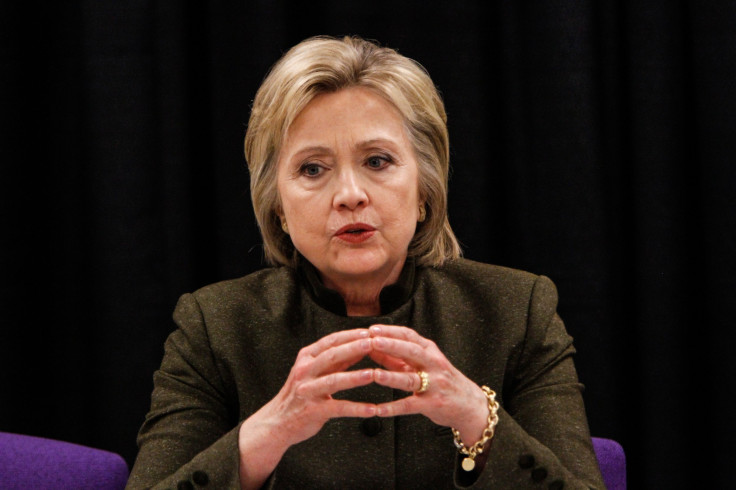Hillary Clinton, Before Spotlighting Crisis In Flint, Michigan, Voted Against Measure To Prevent Groundwater Pollution

When the Democratic presidential contenders meet on Sunday for their debate in Flint, Michigan — where thousands of residents have been poisoned by polluted water — the candidates’ records on clean water policy are likely to be in the spotlight. Hillary Clinton seems eager for that discussion, recently telling NPR: “The idea that you would have a community in the United States of America of nearly 100,000 people who were drinking and bathing in lead-contaminated water infuriates me.”
But despite that rhetoric, the issue of clean water may be politically perilous for the leading Democratic candidate, thanks to her vote against banning a possible carcinogen at the center of one of the largest water pollution scandals in recent history.
Facing reports that a controversial fuel additive was contaminating water supplies across America, Clinton as a senator in 2005 opposed a bipartisan measure to ban the chemical — even though Bill Clinton’s Environmental Protection Agency had first proposed such a prohibition. At roughly the same time, one major company producing the chemical also tried to use provisions in a trade deal backed by Hillary Clinton to force local governments in the United States to let it continue selling the toxic compound.
Clinton’s campaign did not respond to International Business Times’ questions about her vote.
At issue was the chemical known as methyl tertiary butyl ether — or MTBE. Though the compound makes fuel burn cleaner, by the end of the 1990s, scientists began detecting an increasing amount of the potential carcinogen in groundwater supplies. In 2000, a federal study found that drinking water wells in up to 31 states were at risk of MTBE contamination, and by 2003, the compound had contaminated drinking water supplies for more than 15 million Americans, according to data compiled by the Environmental Working Group. Seventeen states ultimately joined together in lawsuits against the major producers of the compound, including ExxonMobil — which became a major Clinton Foundation donor.
Amid the uproar, Washington lawmakers in 2005 proposed an amendment to national energy legislation that would have banned MTBE. By that time, 21 states had passed legislation banning the use of MTBE, including New York.
“When leaked or spilled into the environment, MTBE may cause serious problems of drinking water quality,” Sen. Pete Domenici’s legislation stated in its justification of the phaseout. “In recent years, MTBE has been detected in water sources throughout the United States.”
Breaking with then-Sen. Barack Obama, Clinton joined 14 Republicans and 11 Democrats in voting against the measure to phase out MTBE, which passed the Senate by a vote of 70-26. Critics of the amendment to ban MTBE, like New York Democratic Sen. Chuck Schumer, charged it would end up forcing states to use more ethanol.
When Clinton cast her vote against banning MTBE, she was in the midst of a re-election campaign in which she raised more than $74,000 from the oil and gas industry, according to data compiled by the Center for Responsive Politics. But her record was not one of unanimous support for that industry.
One month after Clinton voted against the MTBE ban, the Environmental Working Group claimed an EPA draft report had found MTBE to be a “likely” carcinogen, linking it to cancers like leukemia and lymphoma.
A subsequent press release from Clinton’s senate office announced she and her colleagues were requesting additional information about the study. The release noted that MTBE had caused “serious damage to water quality nationwide,” and asserted that “Congress should act to discontinue the use of MTBE.” It also declared Clinton’s opposition to a proposal to give MTBE producers legal immunity from environmental and public health lawsuits.
Though the MTBE ban was not included in the final energy legislation, the new bill did include language discouraging the use of the chemical. Despite expressing concerns about MTBE, Clinton voted against the overall bill, which passed the Senate 74-26.
One Clinton critic says her vote against banning MTBE could be a vulnerability. Last year, Democratic operative Matt Barron cited Clinton’s vote as one of a handful of issues that could cost her in the presidential campaign as she tries to win over voters in rural areas.
Though MTBE was eventually phased out of domestic gasoline supplies over the last decade, the controversy over the additive continues to simmer. In recent months, concerns about MTBE contamination have once again arisen in states such as Kentucky, Connecticut, Massachusetts and New Hampshire.
John Osborne contributed to this story.
© Copyright IBTimes 2024. All rights reserved.












